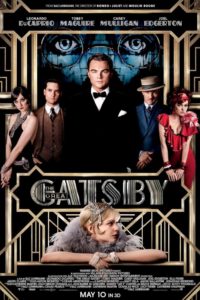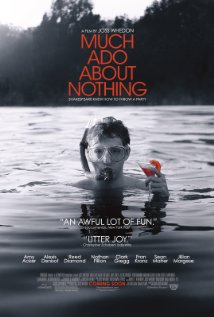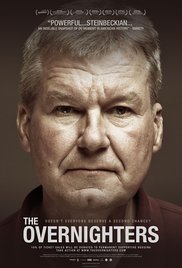I s it necessary to do a spoiler-free review of a movie based on a book that’s almost a century old? Probably not, but there’s inevitably someone out there complaining when someone spoils the end of The Empire Strikes Back (okay, that was me–I couldn’t believe someone had “ruined it” for The Celt. She hadn’t seen the movie, so how could she know who Luke’s father was? Darn spoilery people types…).
s it necessary to do a spoiler-free review of a movie based on a book that’s almost a century old? Probably not, but there’s inevitably someone out there complaining when someone spoils the end of The Empire Strikes Back (okay, that was me–I couldn’t believe someone had “ruined it” for The Celt. She hadn’t seen the movie, so how could she know who Luke’s father was? Darn spoilery people types…).
In case you’re an oddball (curmudgeon?) like me, here’s your short, spoiler-free review. Baz Luhrmann’s usual penchant for spectacle on an enormous scale is at times a boost and at other times a hindrance to this classic American novel set in the Roaring Twenties. But it’s able to find its heart when it stops trying to party and instead focuses on its characters.
There you go, end of no spoilers.
Seriously, why are you still here if you don’t want them? Spoilers, dead ahead!
*clears throat* While Luhrmann’s past efforts (most notably Moulin Rouge) show that he can use spectacle to enhance his story, he’s more hit and miss with this element in Gatsby. First of all, his modern/historical parties can feel tonally out of place with the 1920s setting. Where Moulin Rouge is frequently tongue in cheek and a musical, both of which allow for more leeway with anachronism, Gatsby is a more serious movie–so the DJs and occasional rap songs feel more out of place than they should. Where the songs work best is when they are integrated more naturally with the scene, with modern songs being sung like they were a current hit of the 1920s (if I’m not mistaken, Florence Welsh of current band, Florence + the Machine, is a singing partygoer lounging on a piano at mid point in the film).
The parties are also overly chaotic. This makes sense for some of them, but a later scene where Nick eats lunch with Gatsby and Meyer Wolfsheim has much of these chaotic party elements for no reason. Yes, it’s a speakeasy, but speakeasies were not continuously neverending parties and that’s not what the scene is about: rather than adding anything, the huge party atmosphere is more distracting than anything else.
Where the parties do work is in their contrasts. While the party Nick attends with Tom Buchanan early on in the movie has many chaotic elements that can detract from it, they do serve as an amazing counterpoint to Gatsby’s afternoon visit with Daisy later in the movie. You can’t help but compare the afternoon with all the party scenes, and this smaller focus on Daisy and Gatsby meeting for the first time in years makes it all the more delightful.
This is indicative of the entire film. Luhrmann’s interpretation first found its feet for me when Gatsby finally arrived. Leonardo DiCaprio’s Jay Gatsby is merely talked about for the first twenty or so minutes of the film, and once he enters, he is sympathetically human, understandable, and varied. He’s somehow the suave host of his massive parties, and also the overly dramatic and moody man that knocks on Nick Carraway’s door before meeting Daisy, soaked by a downpour and halfway certain that this moment–the one he has been working to for years–just won’t work. When the movie and its sometimes disparate elements allow him to, we can feel Gatsby’s “immense capacity for hope.” Both its beauty, and its misguidedness.
Its other characters are not always as strong, but a good ensemble. Tobey Maguire is much as we would expect here, but his good-natured moderateness fits Nick Carraway well. Carey Mulligan fits the bill as Daisy, and is much more easily seen as an object of Gatsby’s desire than performances in past films (I’m looking at you, Mia Farrow, you of the obnoxious “I can’t stand ’em” voice). Joel Edgerton is serviceable as Tom, but other than for the film’s final 30 minutes or so, he’s too much of a bad guy. We can see no reason why Daisy has married him or loved him in the past.
Enough. More could be said about the movie and its strengths and weaknesses. Why did Luhrmann decide to make Nick Carraway so traumatized by the events of the story that he is now in a sanitarium? Why did Luhrmann give Gatsby a moment of near murderous rage toward the end of the movie? Why does he over-narrate his movie (when the camera serves part of the function narration does in a book)? Heck, why is Myrtle yet another slender Hollywood actress, when she is described in the book as “faintly stout,” yet able to carry her “surplus flesh sensuously?” Trust me, I could go into these: I did a Master’s thesis on Gatsby, I love the book that much.
Such questions and thoughts would have a point, but miss the better point of the movie. Its soul (as is the book’s) is in Gatsby and his green light at the end of the dock. It comes back to this time and again and finds it once more at the movie’s end… and nothing, not all the unneeded narration or party scenes, nor any of the movie’s other small missteps, can take that away. This, if nothing else, make this version of Gatsby worth a look.




